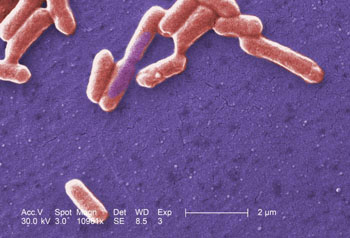Nanoscale Biosensor for Detection of Pathogenic Bacteria under Field Conditions
By LabMedica International staff writers
Posted on 27 Jun 2016
A team of bioengineers used nanoscale technology to develop a simple, portable biosensor system for detection of pathogenic bacteria – such as the diarrhea-causing Escherichia coli (E. coli) 0157:H7 – under field conditions. Posted on 27 Jun 2016
Investigators at Washington State University (Pullman, USA) used organic and inorganic components to create nanoparticles, which resembled miniature flowers under the microscope. These "nanoflowers" provided a large surface area for immobilizing the enzymes that needed to detect low levels of the bacteria. Binding of the specific target bacteria triggered a change in acidity that was amplified to be measurable on a handheld pH meter or with a pH indicator paper strip.

Image: A colorized scanning electron micrograph (SEM) showing a number of Gram-negative Escherichia coli bacteria of the strain O157:H7 (Photo courtesy of the CDC).
“We want to take these nanoflowers and create a simple-to-use, handheld device that anyone can use anywhere,” said senior author Dr. Yuehe Lin, professor of mechanical and materials engineering at Washington State University. “It will be as simple as using a pregnancy test strip or a glucose meter.”
A patent application has been filed for the methodology, which was also described in the June 15, 2016, issue of the journal Small.
Related Links:
Washington State University














